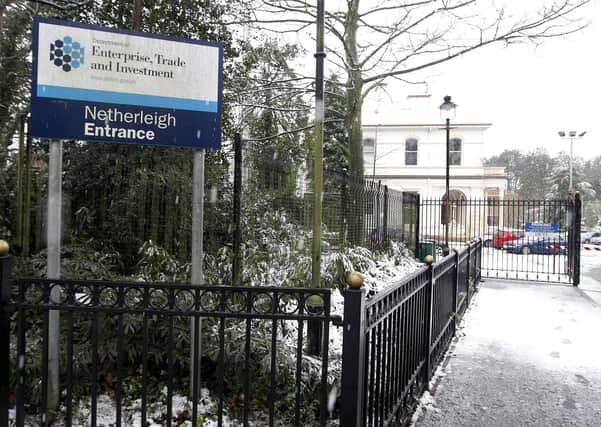Lord Empey: As a unionist and as Arlene Foster’s predecessor as DETI minister, RHI distresses me


Things were very different in DETI’s Netherleigh House headquarters when I was there.
We chose DETI as our first ministerial selection because it would be dealing with the largest slice of North-Southery and David Trimble wanted a firm hand on this as he was afraid that nationalists would exploit this area of the Belfast Agreement.
Advertisement
Hide AdAdvertisement
Hide AdI was involved in the formation of Intertrade Ireland and Tourism Ireland. Ironically, the largest chunk of north-south co-operation took place in energy, even though there were no formal arrangements between Stormont and Dublin in this area. It was department to department and minister to minister only.


When I got my first day brief, I was advised that although energy was a departmental responsibility, I would not be troubled by it. How wrong they were.
I can say that despite what officials said, I spent more time on energy than any other subject. At least I left something to show for it; a new South-North gas pipeline, delivered under ministerial direction, the electricity interconnector, and a new efficient gas-fired power station in Londonderry replacing the inefficient clapped-out old oil-fired one at Coolkeeragh.
I can say without hesitation, that the energy branch was the best in the department, headed up by Jim McKeown and the late Jack Beattie. We worked with the regulator, Douglas McIldoon, and did our best to extract our economy from the contracts which were entered into under direct rule and which give us the highest charges in the UK.
Advertisement
Hide AdAdvertisement
Hide AdWhen I read about the role of the different permanent secretaries, I was shocked.
The goings on with some of the civil servants involved in RHI were unimaginable to me, even after nearly seven years as a minister. The department would have run me down for a box of paperclips, never mind the footloose and fancy-free manner in which things were handled.
If I went to the loo there would have been a minute to that effect. They minuted everything. This was essential, as how else was the department at large to know what I wanted to achieve? The minutes were circulated to the relevant branch, and this was how my wishes were transmitted to the department.
The only other way was to tell them verbally (which would have to be followed up in writing) or for the permanent secretary to send out memos. This was essential for good governance but also for protecting the department.
Advertisement
Hide AdAdvertisement
Hide AdThe one bit I don’t get in all of this is the role of the Department of Finance and Personnel (DFP). It has lines of expenditure on its forms; each line has a number and projections. I understand how Annualy Managed Expenditure (AME) money comes directly from the Treasury, rather than from Stormont’s budget, but even so, I don’t understand how and why it was not clear from the beginning where the money was coming from. That is usually ground zero for DFP.
But the bigger picture is of course the culture that was around the politics of all of this. In my time in the Executive, it would be unheard of for a spad to come into another minister’s department without permission, let alone trying to overturn ministerial decisions, as has been alleged.
Of course the DUP operated differently, as did Sinn Fein. My party would never have any say in how I ran the department and no papers would go to the party.
The sleekit way in which advisors leaked material to the press shocked even me.
Advertisement
Hide AdAdvertisement
Hide AdHowever, as Sam McBride concludes in his book Burned, it is unionism plc that is the real loser in all of this. As the man in the street looks in, what is the difference between what is alleged to have happened here and the Fianna Fail tent at the Galway races?
To see ministers like Jonathan Bell, someone totally out of his depth, running the place was disconcerting.
It is hard to identify where Northern Ireland was benefiting from the ‘fill your boots’ mentality.
I spent many years of my political life trying to get Stormont up and running. To read about it being abused and run as it was has been most distressing.
• Ulster Unionist peer Lord Empey was DETI minister from 1998 to 2002